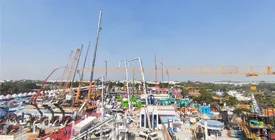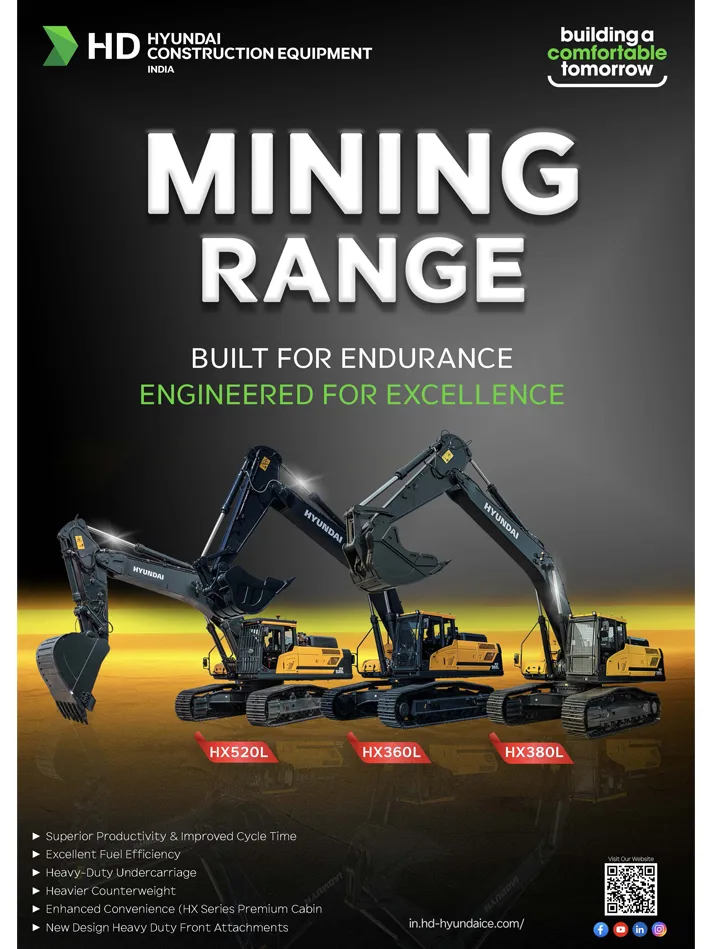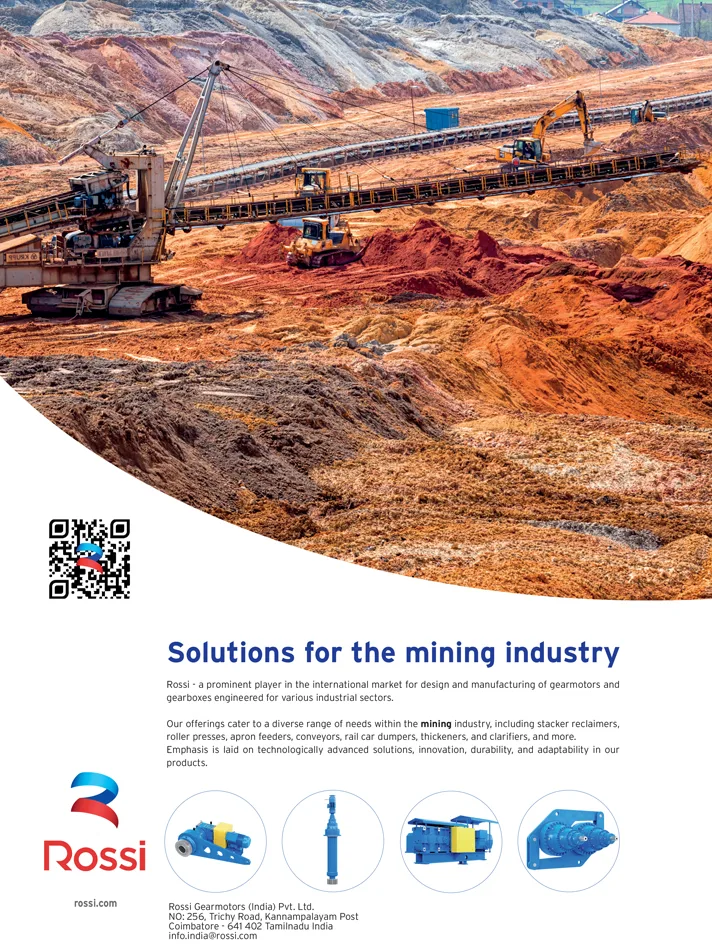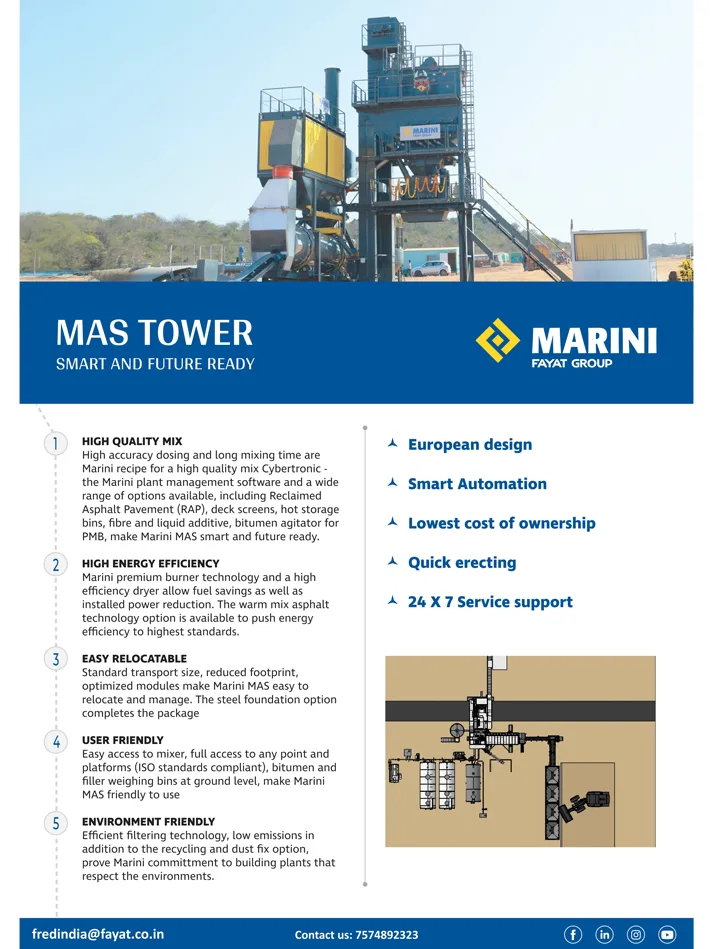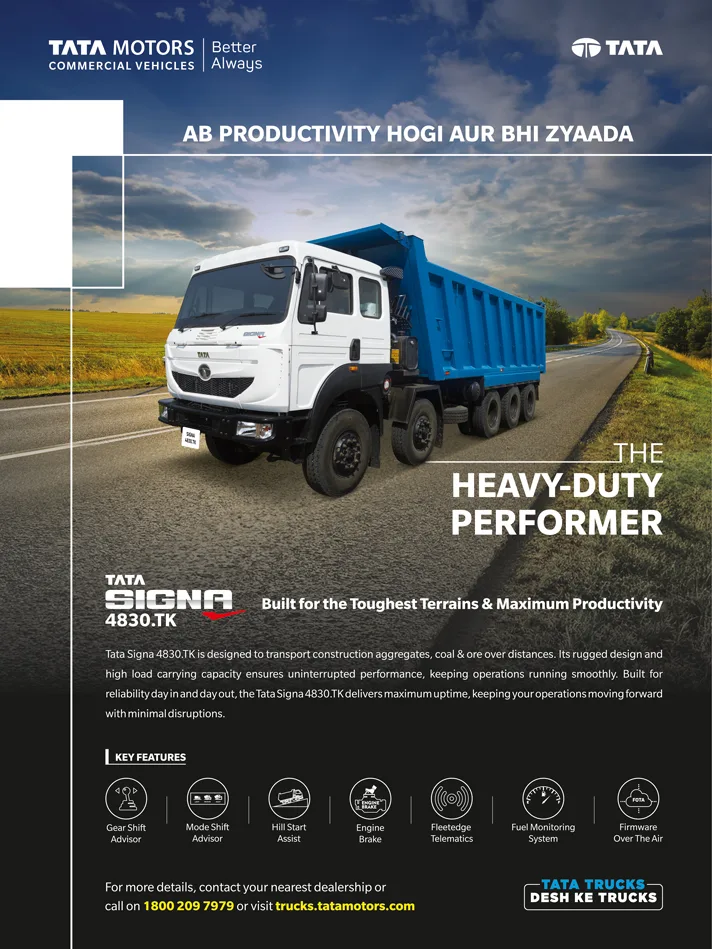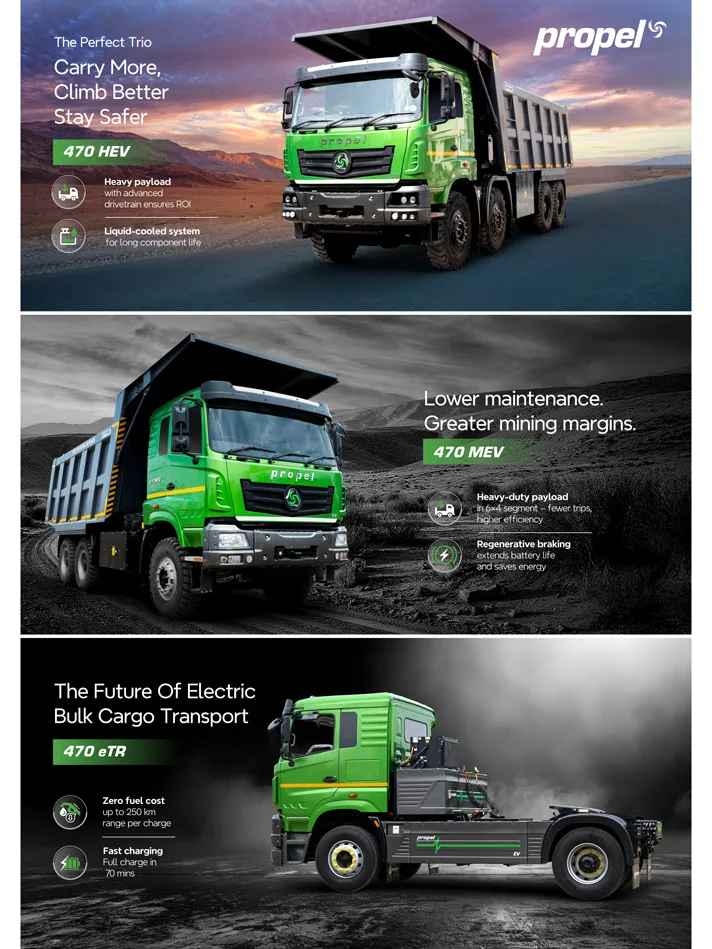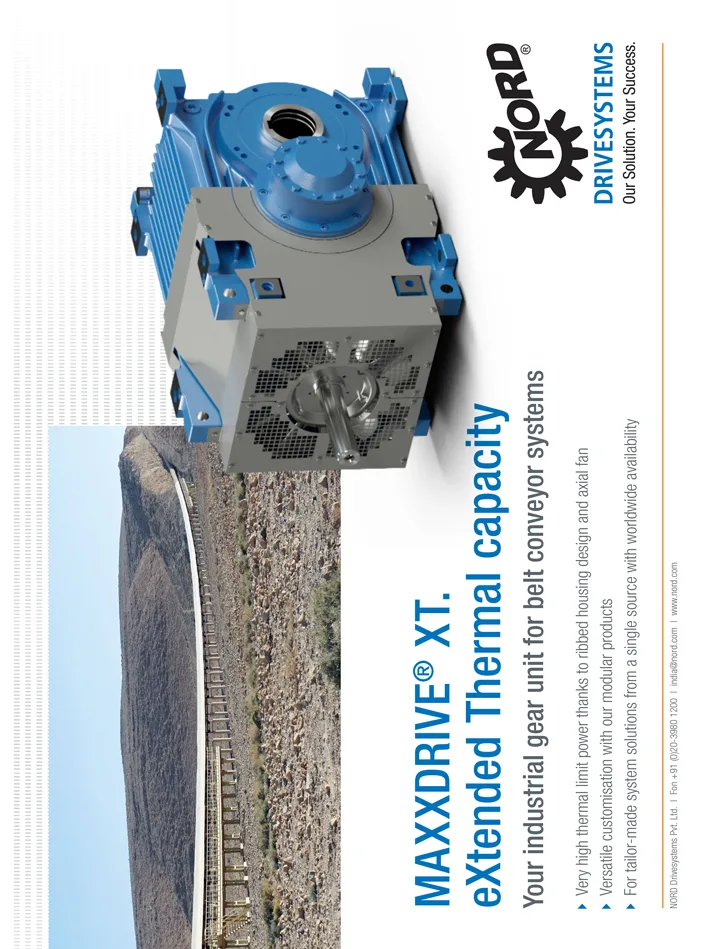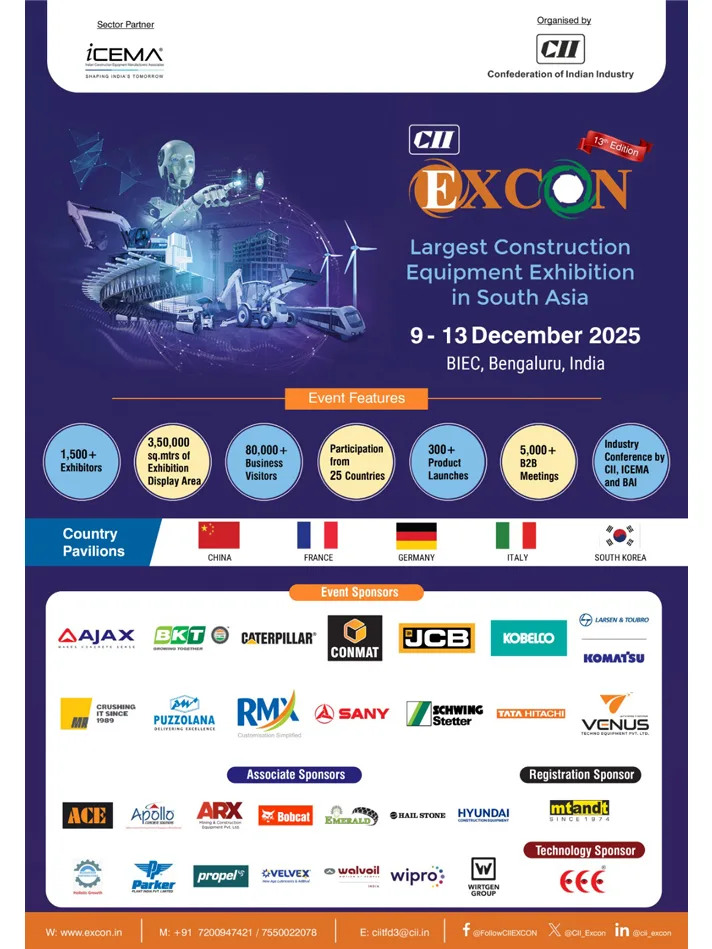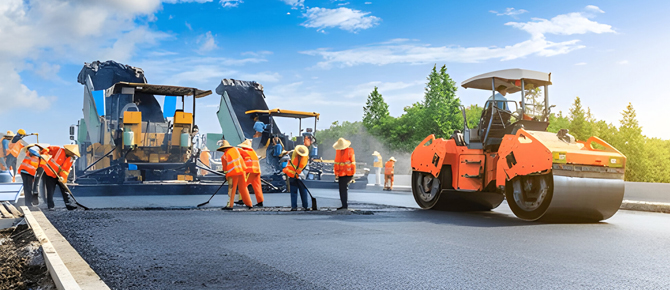
Compaction & Paving Equipment
SETTING A STRONG FOUNDATION
The growing demand for road construction and maintenance projects, coupled with advancements in technology for more efficient and sustainable equipment, is boosting market growth for compaction & paving equipment in the country and across the globe. Looking at the latent opportunities waiting to be tapped, equipment manufacturers have been placing immense emphasis on developing futuristic products that are not only cost competitive but are also sustainable to operate and easy on maintenance. Here’s tracking the progress made by this segment in the recent years and what lies in store to offer a fillip to the overall road construction sector… writes, PRERNA SHARMA.
The compaction and paving equipment market has witnessed significant growth in recent years, driven by increasing investments in infrastructure development projects globally. The market is expected to continue its upward trajectory, with a CAGR of over 6% projected over the next five years. This growth can be attributed to the rising demand for efficient and sustainable construction equipment solutions, as well as the increasing focus on road maintenance and rehabilitation activities. Additionally, technological advancements in compaction and paving equipment, such as the integration of GPS and telematics systems, are further driving market expansion.
New age equipment setting the trend

According to Puneet Vidyarthi, Head of Marketing & Business Development – India & SAARC, Case Construction Equipment, “In India, the government has embarked on transformative initiatives like the Bharatmala Project, aimed at the comprehensive development and enhancement of the national highway network. Compaction sector assumes a pivotal role in shaping infrastructure landscapes, prompting a proliferation of road and highway construction endeavors across various regions. Moreover, India’s National Infrastructure Pipeline (NIP) is poised to expedite the development and modernization of road and highway networks. NIP, steered by the government, identifies transportation as a critical priority and has allocated a staggering $1.4 trillion for infrastructure investments by 2025.”
Vidyarthi adds, “Our Compaction & Paving equipment portfolio is designed to cater to a wide range of compaction and road construction needs. One of our key offerings is the CASE 952EX Soil Compactor, a robust machine built for medium to heavy-duty tasks. Equipped with a state-of-the-art diesel oxidation catalyst (DOC) system, it ensures comprehensive after-treatment and up to 5% higher fuel efficiency. This compactor features an electronically turbocharged engine compliant with BS (CEV) IV (India) regulations, guaranteeing improved responsiveness and overall performance. Safety is a paramount consideration, with features like a secondary braking system, exceptional front and rear visibility, a sliding operating seat, and excellent ground clearance for effortless maneuverability. The advanced console provides a clear and intuitive display with 19 visuals and 10 auditory warnings, including crucial information such as water in fuel, low engine oil pressure, and more. For added practicality, it includes a 12V power socket for mobile charging. Compact and highly portable, the 952EX is an excellent choice for various construction and road compaction applications.”
Additionally, its latest addition, the 1107EX PD Soil Compactor, is tailored for versatile applications and typical compaction tasks. It offers a standard drive and smooth drum along with a pad foot drum and double drive for compressing cohesive materials. This machine incorporates advanced features like ECO mode and One Touch Idle mode, delivering up to 6% improved fuel efficiency. Furthermore, it boasts a low-maintenance design thanks to its state-of-the-art engine technology, aligning perfectly with the evolving needs of the road construction market. We have recently upgraded the edition of Vibratory Compactor (VC), which is the sole one in the sector that incorporates telematics, underscoring our dedication to pioneering advancements.
For Dynapac, the key advancement is the introduction of its Seismic technology to the asphalt compactor range. This system was first developed for its single drum rollers for use in earthmoving applications. The technology uses sensors that determine the resonant frequency of the material underneath the drum and then adjust the compaction forces accordingly. The benefit of the system is that it ensures more efficient compaction as the dynamic forces are optimized to suit the working conditions. The system ensures that the work is carried out to specification, without risking over-compaction. This reduces fuel consumption as well as the number of passes the machine makes.
SEISMIC technology for asphalt offers a whole host of benefits for both optimal compaction and operator comfort. SEISMIC automatically determines the optimal frequency for any compacted material, constantly monitors the variations, and automatically adjusts to changing conditions. The SESIMIC system is active on both drums to help reduce the required vibration power and energy consumption. The resulting lower noise levels and vibrations within the cabin provides the operator with greater comfort, while a general reduction of the number of passes which saves time, fuel, and money.
The Dynapac CC2200 VI recently completed a rigorous set of tests throughout Europe and the United States, including a major highway project for Superior Paving, and is set to redefine the standards of efficiency and precision in road paving compaction. The CC2200 VI weighs 7.6 tons and features a 59-inch drum, which is ideal for finish rolling on a variety of job sites. It includes a Tier 4 Final diesel engine with a high torque setting, efficient patented eccentric weights, and an ECO Mode for fuel efficiency.

Vishwesh Rai, General Manager, Fayat Road Equipment, Sales India, said “In current scenario, it is demand of time that we need innovations for speedy and quality road construction. Dynapac has inherited the culture of continuous improvement & innovation for superior performance & reliability. Our equipment is designed to perform and built to last in terms of low cost of ownership, quality results, high productivity, Jobsite confidence & excellent serviceability. In compactors, we have optimized eccentricity for better fuel efficiency & economy. Dynapac was the first to introduce efficient eccentrics system to the market in 2016. Dynapac equipment are equipped with high degree of intelligent compaction system.”
Coming to the market soon from BOMAG will be a novel braking system, which will be available on the ROBOMAG BW 154 asphalt roller (as well as the ROBOMAG BW 177 soil compactor). The Emergency Brake Assist system scans the construction working environment in real time and identifies moving and static obstacles and objects. Objects that could be put at risk by the machine’s movement are detected by the system.
If a collision is imminent, the system slows the machine down to a complete stop. By averting potential hazards, the technology marks a significant milestone in enhancing on-site safety. Recognizing its added value, the jury at the INTERMAT Awards in Paris honored the technology with the prestigious Gold Award in the “Roads, Materials and Foundations Industries” category.
In cooperation with selected customers, BOMAG plans to test the Emergency Brake Assist on various construction sites this year. The company’s service organization is also involved in refining the technology for series production, ensuring that customers receive the same first-class service for digital systems as they do for mechanical components. Emergency Brake Assist is compatible with BOMAG’s fifth-generation tandem rollers and therefore independent of use beyond just a fully autonomous asphalt roller. As the technology nears production readiness, the final certification is being worked on in cooperation with experts, which is critical when safety-related innovations are involved.
As another feature in its cap, the ASPHALT PRO software solution from Bomag enables site managers to significantly simplify the planning of an upcoming road construction project, monitor the ongoing paving process in real time and, if necessary, quickly take corrective action. Proactively following the mix plan and adapting automatically as the project progresses: ASPHALT PRO communicates the current requirements in real time. Should paving be delayed or material be missing: the mixing plant supervisor always knows the exact amount to be mixed – neither too much nor too little. And, of course, the site manager is also informed if production at the mixing plant encounters any delays.
ASPHALT PRO adjusts the timing of material deliveries automatically and continuously, taking into account the remaining mix requirement and the actual turnaround times. Truck drivers can view the route on the app and receive other important information: when loading and unloading should take place. At the same time, those responsible at the construction site know the timing of the next material delivery.
From Hamm comes a new development in the shape of its HD+ 120i V-VIO-2 HF. This innovative compactor offers the benefits of compaction by vibration and oscillation. While other machines (from Hamm and some competitors) have been able to offer this combination previously, they have been restricted to having one drum for vibration and the other for oscillation. The new HD+ 120i V-VIO-2, however, offers both vibration and oscillation on both drums. This allows the operator to combine the compaction types, depending on the application.
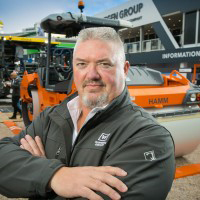
Tim Kowalski, Product Specialist for Hamm at Wirtgen Americas, commented, “We can run dual oscillation, or you can have vibration and oscillation.” He said that the operator can set the machine so that it delivers vibration at the front and oscillation at the rear and then switches automatically when it reverses direction. He explained that this better suits the machine to use with new mix types, which can prove more challenging to compact with conventional equipment. The operator can switch easily between vibration and oscillation, removing the need to switch machines or deploy an additional machine and another operator on the construction site.
A key feature is versatility as it offers static compaction, oscillation and vibration. This versatility means that the same machine can be used for different asphalt mixes. The combination of vibration and oscillation delivers fast compaction in fewer double passes, suiting it to final compaction. High compaction quality is claimed even at increased working speeds. The machine has the latest Hamm cab, offering good all-round visibility as well as various interfaces to connect telematics systems, fleet management systems and digital applications for controlling and documenting compaction.
Joseph Vögele AG is launching two new pavers on the Indian market: the cost-efficient SUPER 1900-3 G-Tier with the ErgoBasic operating concept and the advanced P-Tier version of the SUPER 1900-3 with the expanded ErgoPlus 3 operating concept plus extra convenience functions. As Universal Class machines, both models have a broad range of applications: depending on the screed combination, they deliver pave widths up to 10 m. Both pavers have a laydown rate of up to 1,000 t/h, and their rugged material handling components enable them to pave asphalt mixes and abrasive materials such as cement-treated base (CTB) efficiently and in high quality.
Vögele’s modern drive concept is adapted to the wide range of uses of multifunctional pavers. Both are powered by a high-performance 6-cylinder diesel engine rated at 145 kW and meet the strict emission standards of CEV Stage V. The engine features an ECO mode which reduces nominal speed from 2,000 rpm to 1,700 rpm, cutting operating costs and noise emissions to a significant extent. All the drive components, from the diesel engine to the hydraulic system, operate with maximum efficiency. The SUPER 1900-3 P-Tier is furthermore equipped with the Vögele EcoPlus low-emissions package which reduces emissions further and cuts fuel consumption by as much as 25%.
A continuous flow of mix is key to ensuring uninterrupted, high-quality paving, which is why Vögele attaches such importance to professional material management when designing its pavers. It is also essential when the new pavers are used for roadbase applications. The long, extended hopper with a capacity of 15 t permits fast unloading of trucks, whilst its powerful conveyor system (longitudinal, lateral) delivers a high throughput rate and continuous material flow.
Both models are equipped with a powerful, low-emission engine and are equally suitable for motorway projects and for constructing rural roads. The cost-efficient, heavy-duty SUPER 1900-3 G-Tier tracked paver and the powerful, advanced SUPER 1900-3 P-Tier paver facilitate pave widths between 3 m and 10 m. Both pavers are designed specifically for the Indian market and offer users particularly straightforward operation, each with a different range of functions.
The patented Ammann triple-shaft exciter system provides industry-leading climbing ability and compaction output. It ultimately delivers outstanding results, even on cohesive soils. The triple-shaft exciter system eliminates erratic movements, allowing smooth travel even through heavy, cohesive soil. The unique system’s consistent movement enables effortless climbing over obstacles or while compacting backfill materials with high moisture content. This is done without the usual suction effect, which can leave plates at a standstill. The ease in handling and manoeuvering of the plate is particularly helpful when the use of low frequency/high amplitude is required.
ACE is a proprietary compaction system from Ammann that provides accurate, real-time data to operators. Precise, transparent and verifiable compaction processes increasingly are required on construction sites. Ammann took the first steps toward providing these processes in 1998 with the advent of Ammann Compaction Expert (ACE), an automated compaction measurement and control system.
Ammann India launched several new products, including a 7m track paver and a 9m track paver (both of which are entirely indigenous), a battery-operated 2-ton tandem roller, and a 5-ton soil compactor, making it the only company in India offering a soil compactor of smaller capacity. Currently, most customers rely on tandem rollers for soil compaction in the less than 9-ton segment for lack availability of smaller soil compactors in the market.

“Our latest asphalt batch mix plant is significant for its environmental control features; it can take RAP materials up to 60%, setting a new standard in technology. In contrast to our competitors, our technology ensures a perfect mix without the risk of bitumen burnout, resulting in higher road quality. The first plant has already been supplied to GR Infra, a Delhi-based contractor, with over 100,000 tons of asphalt produced and laid,” informed Dheeraj Panda, MD, Ammann India.
“Recycling is gaining popularity, driven by government initiatives for environmental conservation. We have the technology to achieve up to 100% recycling, leveraging our parent company’s extensive experience as a 155-year-old company in asphalt plants. We also offer alternative environmental solutions, such as gas, hydrogen, and coal ash as alternative fuels to reduce pollution,” he added.
The company’s product range includes a 30 cubic meter concrete plant with a unique pan mixer design (deviating from the typical drum type mixer). It also has a self-designed 60 cubic meter concrete plant. “Concrete production is a significant area for us, besides other equipment like battery-operated machinery. However, the adoption of battery-operated equipment in India faces challenges due to the higher cost compared to diesel-operated machinery. We are actively working on cost-benefit analyses to demonstrate the long-term cost and other advantages.”
Ammann India has made substantial investments in enhancing its production capabilities, with in-house fabrication and advanced technologies such as robotics. “India’s market is known for its price sensitivity. Although we have advanced technology, contractors may not adopt it unless the government mandates the use of non-conventional energy sources or alternative fuels. Nitin Gadkari has been vocal about these issues, emphasizing the need for environmentally friendly practices,” said Dheeraj Panda.
In terms of ESG initiatives, Ammann is actively working to reduce carbon footprints globally. Regular meetings are held to monitor progress in India, and it plans to invest in emission reduction initiatives during 2024-25. “Transitioning from BS4 to BS5 emission norms will naturally decrease our carbon footprint, and we are exploring sustainable energy sources such as solar and wind power for our factories to further reduce our environmental impact. There is so much talk about green buildings, but the promotion of the green building concept is hindered by lack of case studies demonstrating their long-term benefits. The cost perception of green buildings as expensive, needs to change also, since many forums argue that green construction can be more economical over time,” said Dheeraj Panda.
“To reduce environmental impact in our asphalt plant, we have implemented advanced filtration systems to control emissions and have explored alternative fuels like ethanol, wood dust, gas, and even hydrogen, keeping in line with European standards, especially in environmentally conscious states like Goa and Kerala.”
Caterpillar Inc. recently announced updates to the mid-sized asphalt compactor line. The Cat® CB7, CB8, and CB10 Asphalt Compactors continue to build upon the proven performance of their predecessors with edge-management options, optional cab, optional split drums, and a new mapping display.
Asphalt compaction can make or break a project and meeting the required density and smoothness specifications can be essential to maximizing profitability. In doing so, having operators that can stay alert for longer periods of time to perform effective rolling patterns that cover the entire surface can be a key to success. Features like AM/FM Bluetooth Radio and the heated seat combine with spacious seating and legroom, unobstructed sight lines, and climate control functions that can help operators perform at their best.
Proper management of unconfined edges can help optimize density and lead to better road quality. The vertical edge created by the cut-off wheel helps provide a stable vertical face for joint matching on the next paving pass. The bevel edge options provide sloped profiles for smoother transitions on and off the paved surface. Three versions are available to help contractors meet job site requirements.
The new mapping display provides an enhanced on-screen visual for easier recognition and touchscreen capability for simplified setup. Cat® Compact helps operators visualize the coverage area while recording pass-count and temperature data. The system utilizes infrared temperature sensors and GPS mapping to keep the operator informed of current mat temperatures, machine position, pass-count and pass coverage. This intuitive system enhances nighttime performance, while also capturing data for future process analysis and quality control documentation. When combined with drum edge and drum surface lighting, Cat Compact helps extend the workday and increase daily production.
One of the most sought-after soil compactors in the country, the new VM117 compactors by JCB display excellent strength and efficiency. It’s a single drum soil compactor that offers superior productivity and leads the industry in output with the best compaction per pass. The new VM117 Soil Compactor also boasts of the fuel-efficient CEV Stage IV JCB ecoMAX which is a 4.4 litre engine and comes with CRDI technology, for better fuel efficiency. The new VM117 range of road rollers is designed for ease of service.
These road rollers have a wide opening rear bonnet which gives fast access to the engine compartment and provides 100% access to all hydraulic and engine components. The new VM117 soil compactors are designed to provide ultimate productivity. Equipped with proven German vibration technology, the VM117 compactors guarantee desired compaction density in a minimum number of passes. Equipped with the proven CEV Stage IV JCB ecoMax engine, the new VM117 compactors are up to 10% more fuel-efficient. IntelliCompaction is an in-built feature that relays real-time data of the compaction value live in the cabin, avoiding re-work and saving time. has a display for showing the relative compaction value, a warning lamp for jump operation, and a display for vibratory frequency.
What Lies Ahead!
In Germany, starting from 2025, it is planned to use only low-temperature asphalt. This decision marks a significant step towards sustainability and occupational safety in road construction. The production and paving of low-temperature asphalt, due to lower temperatures compared to conventional asphalt, results in lower energy consumption during production and reduced emissions during paving. Even a reduction in asphalt temperature by 30°C results in an average energy savings of 9 kWh per ton. With an annual production volume of approximately 212 million tons of asphalt within the EU-27, this could translate to savings of around 1,900 million kWh of energy or approximately 380 million tons of CO2 emissions per year.
This makes low temperature asphalt an environmentally friendly alternative that sustainably and positively influences the ecological footprint of road construction. Emissions on construction sites are also significantly reduced, which positively impacts the health protection of workers.
Digital solutions play a crucial role in the use of low-temperature asphalt. Cloud-based platforms and mobile applications facilitate information exchange and coordination among road construction stakeholders, leading to more efficient collaboration and an overall increase in efficiency. This efficiency is particularly necessary in the logistics chain. Due to the lower production temperature, the asphalt arrives at the construction site at a lower temperature. However, since a certain minimum temperature is required for paving and compaction, the time frame between delivery and paving is shortened. Information about the expected arrival time of the truck at the construction site and its load temperature helps site workers to organize the workflow so that there are no delays during unloading, and the asphalt can be optimally paved despite the lower arrival temperature.
In this limited time frame, precise control of temperature and compaction is also crucial. Comprehensive digital monitoring allows the roller driver to compact precisely and quickly where needed. This maximizes the efficiency of the compaction process and ensures uniform compaction of the LTA, even under challenging conditions. Additionally, precise real-time monitoring enables immediate detection of deviations, allowing drivers to respond promptly.
Intelligent Compaction gaining mainstay…
The last 10 years of the construction industry were full of lower productivity rates, and higher operation and maintenance costs. All thanks to the current innovations in the heavy construction equipment sector which has given rise to quality pavement operations. These innovations in the form of advanced techniques are revolutionizing and redefining conventional road-making processes. Among these innovations, the most rewarding one is the IC-equipped road rollers. Such rollers with intelligent compaction intend to resolve the challenges, operator’s issues, and other traditional compaction techniques.
Intelligent compaction aims to compact the terrain in the first run increasing overall operational performance and productivity at lowered duration. By transforming all the traditional compaction challenges, the future of advanced heavy equipment will be brighter than ever!
Fast Facts
- A Market Research Intellect report stated that the Compaction and Paving Equipment will clock a value of around US$173.93 billion by 2031, up from US$96 Billion in 2023. This trajectory suggests a promising CAGR of 8.86% from 2024 to 2031.
- The road construction industry is at a turning point where innovation and sustainability go hand in hand. One of the pioneering developments is the use of low-temperature asphalt (LTA), which not only reduces environmental impact but also leads to lower health risks during on-site paving. The use of low-temperature asphalt not only brings significant CO2 savings but is also significantly supported using digital solutions.
- While tracked pavers offer benefits for larger and more complex road projects, wheeled pavers boast excellent mobility and are generally a good choice on applications requiring a lot of paver movement and relocation.
- Digital temperature monitoring during paving and optimizing passes during compaction help conserve valuable resources. Furthermore, online verification of paving quality serves as a crucial tool in ensuring road longevity, thus making a significant contribution to climate protection.


